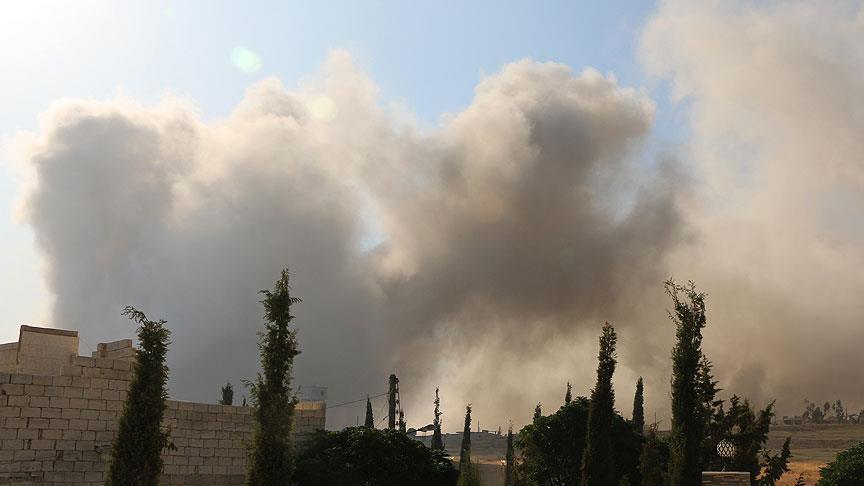Syria: PYD accused of changing demography in Manbij
PYD forces allegedly set ablaze civil registry and land registry buildings in Manbij shortly after taking city from Daesh

Ankara
ALEPPO, Syria
The PYD, the Syrian affiliate of the terrorist PKK organization, is being accused of attempting to change the demographic structure in the northern Syrian city of Manbij.
According to local sources, PYD forces set ablaze civil registry and land registry buildings in Manbij, shortly after capturing the city from Daesh group with the support of the U.S.-led coalition and the U.S.-backed Syrian Arab Coalition.
The sources, who spoke anonymously due to security fears, told Anadolu Agency that the PYD was setting the land registry and civil registry buildings on fire in an alleged attempt to change the demographic structure of the city.
In addition, the PYD has also been allegedly repelling Sunni Arabs and Turkmen residents who want to return to their homes in Manbij on the pretext that Daesh has planted mines inside the houses.
Manbij fell to the PYD and the Syrian Arab Coalition -- both of which fight under the umbrella of what is known as the Syrian Democratic forces (SDF) -- after some two and a half months of fighting.
Ossama Telcu, Aleppo head of the National Coalition for Syrian Revolutionary and Opposition Forces, told Anadolu Agency that it was suspicious that the fire had started on the floor where all the land registry documents were stored, proving, according to him, that it was arson.
"The PYD is the suspect because this group has always followed this ethnic cleansing and deportation policy. This act of arson will also enable the PYD to seize all the properties in Manbij," he said.
Telcu said the PYD-led Syrian Democratic Forces did not allow the families who were not fighting to return back to Manbij.
"This shows that the PYD is trying to change the demographic structure of the city," he said.
Abu Razak, a Manbij resident, said the PYD had also in prohibited residents from returning to the villages of Shuyukh Tahtani and Shuyukh Fawqani, -- east of the Euphrates River -- where nearly 15,000 people live.
Razak said the PYD also banned the families from Bucak and Suluk villages, east of the Euphrates River, as well from going back to their homes. Manbij is located west of the river.
Some 10 weeks ago, the SDF -- backed by U.S.-led coalition airpower -- launched an operation from west of the Euphrates River aimed at retaking Manbij.
The city remained under siege for more than two months, during which hundreds of civilians were reportedly killed in the fighting.
Asked about the U.S. promise to Turkey that the PYD -- a group Ankara does not recognize as a legitimate Syrian opposition movement -- would leave the area after Manbij's liberation, Pentagon spokesman Gordon Trowbridge said Washington understood Turkey's sensitivities regarding the issue.
"Manbij is historically an Arab city. It is our expectation that after its liberation is completed that will continue," he said.
According to Trowbridge, the U.S. has had conversations with the Arab-led Manbij military council about how to reestablish civilian control of the city.
He added that the U.S. was also aware of the historic sensitivities of the Iraqi government and local Arabs in the city and that it took those concerns into account.
The liberation of Manbij is important as it will cut off Daesh militants' key lines of communication between the Turkish border and Raqqa, the self-declared capital of Daesh.
*Reporting by Halit Suleyman and Mohamad Misto; Writing by Sibel Ugurlu
Anadolu Agency website contains only a portion of the news stories offered to subscribers in the AA News Broadcasting System (HAS), and in summarized form. Please contact us for subscription options.

